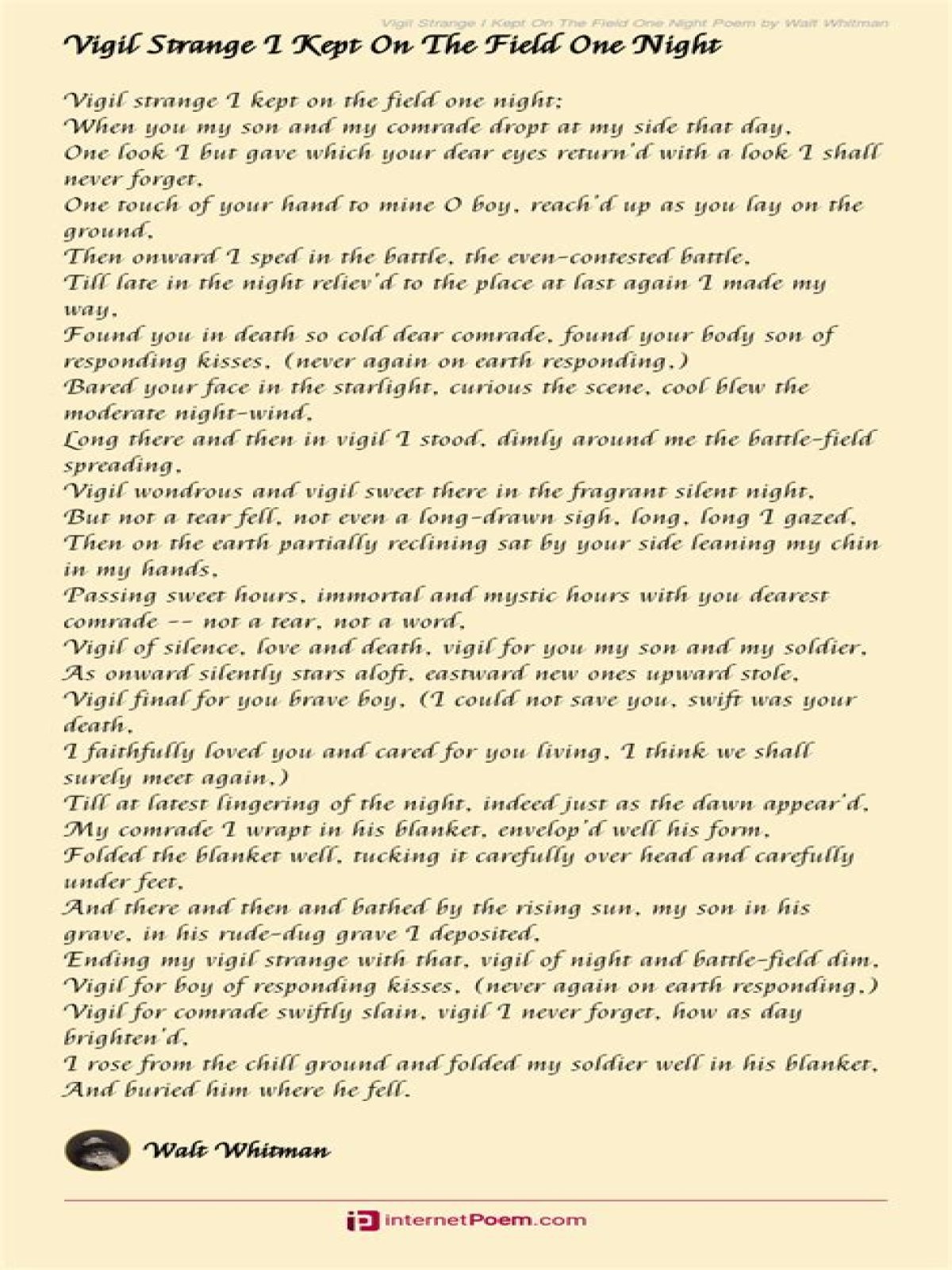What happens in Vigil Strange I Kept on the field one night?
In the poem “Vigil Strange I Kept On The Field One Night” by Walt Whitman, the narrator tells of his son and comrade by his side falling wounded on a battlefield. They touch hands, and then the narrator rushes off to fight in the battle. When he returns that night, his comrade is dead.
What stays with deepest and latest?
Of those armies so rapid so wondrous what saw you to tell us? What stays with you latest and deepest? of curious panics, Of hard-fought engagements or sieges tremendous what deepest remains?
What is a march in the ranks hard Prest about?
In Walt Whitman’s “ A March on the Ranks Hard Prest, and the Road Unknown”, he describes just how terrible the effects of a war are. In Whitman’s eyes, war is traumatizing and painful, but America will shine and push through the darkness. He gives the reader no margin for error, this poem is about the horror of war.
What poetic form is O Captain My Captain?
My Captain!” as an Elegy: This poem is written in the form of an elegy meaning a funeral song. Whitman used very strong figurative language throughout the poem to express his respect and to mourn the loss of Abraham Lincoln.
What deepest remains Walt Whitman?
“What stays with you latest and deepest? of curious panics, of hard-fought engagements or sieges tremendous what deepest remains?”
- What stays with deepest and latest?
- What does the phrase fearful trip represent?
- When was a march in the ranks hard Prest and the road unknown written?
- What type of poem is come up from the fields father?
- What does the prize mean in O Captain My Captain?
- What is the central meaning of the poem vigil by Miller?
What does the phrase fearful trip represent?
A ship’s trip can be fearful because there are many natural and man-made dangers in the sea. But the “fearful trip” that Whitman is referring to is the Civil War, during which he’d volunteered as a nurse in the army hospitals.
When was a march in the ranks hard Prest and the road unknown written?
1865 Written during the Civil War, “A March in the Ranks Hard-Prest, and the Road Unknown” was first published in Drum-Taps (1865). It was incorporated into the body of Leaves of Grass in 1871 as part of the “Drum-Taps” cluster, where it remained through subsequent editions.
Do bells and trills rhyme?
Others like lines 9 and 10 have near, or slant, rhyme (“bells” and “trills”), meaning that the end words rhyme, but not so closely. The last four lines in each stanza also represent a break in the pattern. They’re much shorter than the first four—about half as long, actually.
Who is exulting and where are they?
Exulting means to celebrate with great energy or enthusiasm. I know this because they are also ringing bells and later in the poem it says they are crowded together waiting with wreaths and bouquets. The people standing at the port are exulting (their eyes are following the ship (line 4)), so they can’t be on it.
What is the theme of The Wound Dresser?
Among the themes that emerge from the poem is the pathos of their suffering, and more largely, the agony of soldiers of all wars. The focus in the poem is not on the heroism of battlefield exploits, but on the humble suffering of the men who have been devastated physically, psychologically, and spiritually.
What type of poem is come up from the fields father?
‘Come Up from the Fields Father’ by Walt Whitman is a narrative poem that is written in free verse. This means that the stanzas do not follow a specific rhyme scheme or metrical pattern.
What does the prize mean in O Captain My Captain?
Extended Metaphor – The captain is Abraham Lincoln. The fearful trip is the Civil War. The ship is the United States. The prize is the preservation of the union. The poet refers to the fallen captain as “father,” representing his deep respect for president Lincoln and Lincoln’s role as father of the Union.
Who is Vigil Strange I kept in the field one night?
He is a poet who carries an advertising hoarding, a man singing himself, yet singing humanity. This week’s poem, Vigil Strange I Kept in the Field One Night is from his 1864 volume, Drum-Taps.
Where did Vigil Strange come from?
“Vigil Strange I Kept on the Field One Night” (1865) was first published in Walt Whitman’s Drum-Taps (1865). The poems in the Drum-Taps volume, along with those in Sequel to Drum-Taps (1865–1866), were eventually incorporated into Leaves of Grass, where most of them, including “Vigil Strange,” ended up in the “Drum-Taps” cluster.
When was Vigil Strange first published?
J.R. LeMaster and Donald D. Kummings, eds., Walt Whitman: An Encyclopedia (New York: Garland Publishing, 1998), reproduced by permission. “Vigil Strange I Kept on the Field One Night” (1865) was first published in Walt Whitman’s Drum-Taps (1865).
What is the central meaning of the poem vigil by Miller?
The repetition of the word “vigil” from the title throughout the poem becomes the “central ‘meaning'” (Miller, Critical 159). The narrator must surely feel anguish as he returns to his fallen companion, yet no anguish is overtly expressed.
